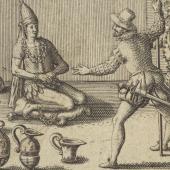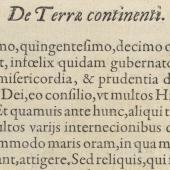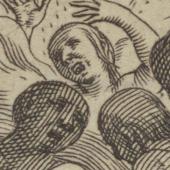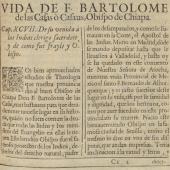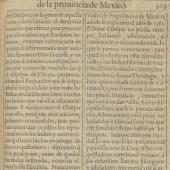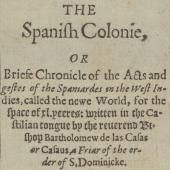Defending human rights (1): Bartolome de Las Casas
800 years of Dominican books
Among the early colonists in the Spanish Americas was a secular priest from Seville, Bartolomé de Las Casas. He acquired a landholding in Hispaniola where the indigenous Indians were required to work in return for protection and Christian instruction (the encomienda system). At Pentecost 1514 Las Casas experienced a radical conversion as he pondered the biblical text of Sirach 34:21–22: ‘The bread of the needy is the life of the poor; who deprives them of it is a man of blood. To take away a neighbour’s living is to murder him; to deprive a labourer of his wages is to shed blood.’ Las Casas saw in this text a divine condemnation of the encomienda, which he would in future attack as a ‘deadly plague’.
A Dominican friar from 1522, Las Casas defended the Indians through his preaching and writings, debate and lobbying. Las Casas related numerous atrocities committed by the conquistadores, condemned the enslavement of the Indians, and defended their rights to self-determination. In his The Only Way to Bring All Peoples to the True Faith, a work sent to the Spanish court in 1534, Las Casas insisted that conversion to Christianity could not be forced, but could only come about through preaching and holiness of life. The work, together with a letter to Pope Paul III from the Dominican bishop of Tlaxcala, Julián Garcés, was a major influence on the papal encyclical of 1537, Sublimis Deus. This decreed the automatic excommunication of those who enslaved the Indians. Las Casas, who was made bishop of Chiapas in 1544, repeatedly crossed the Atlantic to influence the policies of the Spanish crown.
In 1550 to 1551 Las Casas submitted at Valladolid an extended defence of the Indians’ rights against the arguments advanced by a leading opponent, Juan Ginés de Sepúlveda. He subsequently published eight works at Seville in 1552, of which the most widely disseminated book was the Brief Account of the Destruction of the Indies. His magnum opus, A History of the Indies, was only published in 1875, over three centuries after his death in 1566. The Apologética Historia Sumaria, his massive work on Amerindian ethnology and anthropology, begun as part of the History, was not published in full until 1909.
